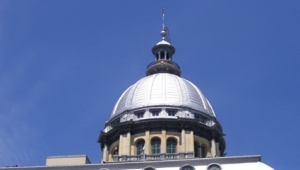
By Illinois Radio Network
SPRINGFIELD – A new bill would require the June property tax bill to be pushed back 90 days and comes as several Illinois counties look at ways to give taxpayers additional time.
Property tax bills are due in June and September in Illinois. Seeing the economic fallout from business shutdowns and layoffs from COVID-19 measures, there’s a new push to waive any penalties for taxpayers not paying their summer property tax bills as long as the payments are made before the September bill comes due.
While state law allows counties to delay payment, East Dundee Republican Rep. Allen Skillicorn has filed legislation that would make it explicit.
“If a disaster is declared by proclamation of the governor for all counties in the state due to a public health emergency, then the first installment of taxes due in that calendar year and remaining unpaid shall not be declared delinquent and shall not accrue any interest as otherwise required…for up to 90 days after the later of June 1 or the day after the date specified on the real estate tax bill as the first installment due date annually,” according to the language of the bill, which had yet to be entered into the state’s legislative database as of Monday.
The bill also puts a blanket 90-day delay of the June 1 tax bill. It wouldn’t affect those who pay property taxes in escrow or those who have prepaid.
“During this difficult time we find ourselves in with the coronavirus, families ordered to stay at home have enough to worry about.,” Skillicorn said. “Property taxes should be the last item to burden residents during this or any other time of a public health emergency.”
The language was crafted with input from Kane County Treasurer David Rickert, who is working with his county board to implement the change locally.
Local taxing bodies would receive the balance of funds they’re owed from property taxes from the county treasurer funds. Once the late payments come in, those funds would be replenished.
Some are concerned that the loss of expected late fees and interest would put a strain on local budgets, according to a report from Patch, because local officials have come to consistently count on a certain number of taxpayers to incur the penalties.
Illinois Radio Network can be reached at [email protected].






